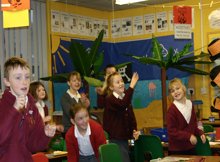The mental and oral starter was one of the successes of the old Primary Strategy. As you start teaching the new curriculum it is now worth considering your planning for this part of your maths lesson.
What are you hoping to achieve from any interactive maths session? What will the children be getting from these mental maths activities?
The Primary Strategy introduced us to the 6 Rs - six features of children's mathematical learning that oral and mental work can support:
Rehearse Recall Refresh Refine Read Reason
Some of these were a bit blurred in their meaning and certainly overlapped in their use, but they were useful in outlining their purpose.
I think that the oral/mental starter is still a great opportunity to have a short, interactive, whole class maths session, even if evidence was showing that a little of the pzazz and purpose had gone from these sessions.
Bearing in mind the 2014 NC aim of fluency in maths, it can be an important and purposeful part of a lesson.
I have been lucky enough to observe a large number of maths lessons, and the most successful 5-10 minute interactive mental maths starters have a very clear purpose to them, shared with the class.
The Primary Strategy introduced us to the 6 Rs - six features of children's mathematical learning that oral and mental work can support:
Rehearse Recall Refresh Refine Read Reason
Some of these were a bit blurred in their meaning and certainly overlapped in their use, but they were useful in outlining their purpose.
I think that the oral/mental starter is still a great opportunity to have a short, interactive, whole class maths session, even if evidence was showing that a little of the pzazz and purpose had gone from these sessions.
Bearing in mind the 2014 NC aim of fluency in maths, it can be an important and purposeful part of a lesson.
I have been lucky enough to observe a large number of maths lessons, and the most successful 5-10 minute interactive mental maths starters have a very clear purpose to them, shared with the class.
Prepare and focus
Explicitly make links to the main part of the lesson, preparing the children for new skills, methods or concepts, reinforcing previous steps necessary for this new learning.
Example: identify fractional parts of shapes prior to lesson on equivalent fractions; locate shapes in a grid as preparation for lesson on coordinates
Quick recall
Build up speed and accuracy in recall of number facts, names of shapes, units of measure, reading the time etc.
Example: speed games for addition facts; ‘show me’ answers from division facts; using a fact you know to recall other facts; using mini-clocks to show different times
Review understanding
Assess, review and strengthen children's previous learning of concepts and skills; return to aspects which the children have had difficulty.
Example: describe properties of shapes taken from lucky-dip bag; work out the area of different rectangles; count on a number line in different steps
Sharpen procedures
Practice and refine strategies, methods and procedures; build on earlier learning so that strategies and techniques become more efficient and precise.
Example: practice method for decomposition for 3-digit subtraction; find 10% of quantities, then 5% and 20% by halving and doubling
Think mathematically
Use reasoning and problem-solving skills to apply acquired knowledge, skills and understanding
Example: solve a 2-step word problem in pairs and discuss methods; prove a hypothesis, using ‘always, sometimes, never’ and explaining why
Practice and refine strategies, methods and procedures; build on earlier learning so that strategies and techniques become more efficient and precise.
Example: practice method for decomposition for 3-digit subtraction; find 10% of quantities, then 5% and 20% by halving and doubling
Think mathematically
Use reasoning and problem-solving skills to apply acquired knowledge, skills and understanding
Example: solve a 2-step word problem in pairs and discuss methods; prove a hypothesis, using ‘always, sometimes, never’ and explaining why
So when you are planning your whole class maths starter activities, think about the reason for including them and reinforce this purpose with the children. There are lots of great, fun, interactive activities out there to try, but without a clear purpose they won't support the learning of the children, which is such a great shame, and so easy to put right.
Related articles:
Each child having their own maths kit really helps your classroom organisation for interactive mental maths sessions.
Make your own interactive maths kit
A fractions wheel and angle estimator to add to your maths kit
Another Maths Kit resource - the elastic band strip
Broadbent Maths Planning Menu Users
Interactive Mathematics Teaching
Strategies to support interactive teaching
Available to download for teachers of subscriber schools.



